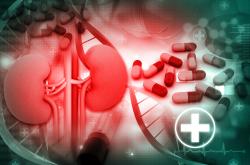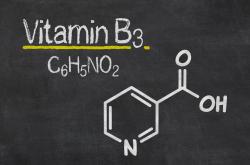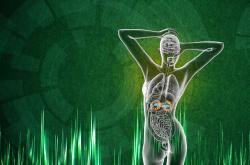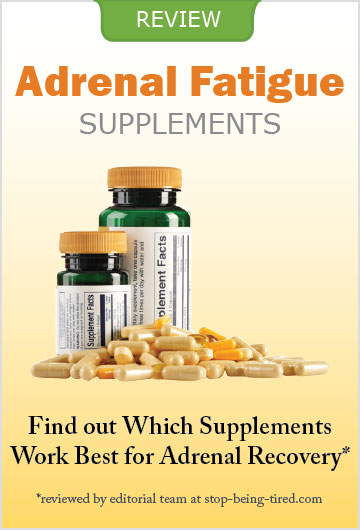How to Recover from Adrenal Fatigue
Adrenal fatigue is a complex syndrome that can involve months of recovery time. Learn how you can get better with dietary changes, stress relief, supplements, adrenal cell extracts and more.

If you’re suffering from adrenal fatigue, you’re not alone. The failure of the medical community to recognize this medical syndrome for what it is has left millions without the care they so desperately need.
The good news is that there is much that you can do on your own to heal from adrenal fatigue.
This article covers:
- Understanding Adrenal Fatigue
- Lifestyle Changes for Adrenal Fatigue Recovery
- Nutritional Supplements for Adrenal fatigue
- Medical Treatment of Adrenal Fatigue
Understanding Adrenal Fatigue
Before you can address adrenal fatigue properly, you need to understand what it is, why it develops, and the symptoms and signs that indicate its presence.
Adrenal fatigue is, as the name suggests, a syndrome that occurs as the result of the depletion of the adrenal glands. This happens due to long term exposure to stress and ends with the complete exhaustion of the adrenal glands.
The problem is simple: your body is designed in such a manner that it has only one way to react to perceived stress. The stress response begins with the hypothalamus (part of your brain) identifying a potential threat – whether real or imagined – and then involves a relayed series of messages that go through the pituitary gland to the adrenals. The message to the adrenal glands is simple: release the cortisol!
Cortisol, of course, plays an important role in managing inflammation and other stress-related issues. Ordinarily, the stress response would occur, the body would be primed with cortisol so that it could deal with whatever issue had arisen, and then a period of lower cortisol levels would follow so that you can properly recover.
Modern Stress Levels Upset the Hormonal Balance
The problem, though, is that the modern world’s level of fast-paced activity and constant interaction with others has left many people in a state of almost constant stress. Whether it’s a bullying boss, problems at home, or something as seemingly innocent as a traffic jam, people are confronted with potential stressors everywhere they turn.
Unfortunately, the body only knows how to deal with stress in one way, and that involves the typical stress response. That means that many people are confronted with a situation in which their bodies are dealing with elevated cortisol levels for prolonged periods of time – without the opportunity to ever recover between stress episodes.
As you might expect, that can quickly lead to overloaded and overtaxed adrenal glands, which then can no longer produce the level of cortisol the body demands. That starts a cycle where the body continues to require cortisol – the stress hasn’t subsided, after all – and the adrenals try but fail to meet those expectations. Eventually, those glands are depleted and producing far less cortisol than the body needs. That leads to dysregulation throughout the body, and inevitable exhaustion.
The Signs and Symptoms of Adrenal Fatigue
- Exhaustion that sleeping doesn’t alleviate
- Severe thirst and cravings for salt or sugar
- Hair loss
- Libido issues
- Severe disruption in the sleep cycle
- Hormone imbalances
- Problems with focus and memory
- Bodyweight changes
- Blood sugar increases
- Deterioration of muscle tone
- Apathy
- Abdominal fat increase
- Yellow skin
- Nervousness, excitability
Lifestyle changes for Adrenal Fatigue Recovery
Some of the most important things you can do to recover from adrenal fatigue are lifestyle changes. While many people rush to resolve every medical condition with pills or other pharmaceutical solutions, the fact is that those options can actually be detrimental to your health and quality of life. Often times, simple changes in your lifestyle can reap tremendous dividends in terms of recovery.
Nutrition
When you’re suffering from adrenal fatigue, getting the proper nutrition is essential for recovery. But there’s more to nutrition than just nutrients. You also have to know when to eat, and which foods and drinks to avoid if you want to truly support your adrenal glands and maximize your energy levels.
What to Eat - Adrenal Diet
The right dietary plan for adrenal fatigue recovery involves a combination of all three macronutrients: protein, carbohydrates, and fats. You may see a lot of diet plans floating around on television or online, promoting carb-free weight loss, or fat-free strategies; ignore them. To ensure that your body receives the nutrients it needs, you must eat meals that include lean protein, complex carbohydrates, and healthy fats.
- Complex carbohydrates are essential for energy, since they are a preferred source of fuel. This food group includes whole-grain bread, brown rice, starchy vegetables and beans.
- Lean protein is critical for providing the amino acids the body needs for healthy tissue. You can get lots of protein by eating meat, dairy, eggs, beans and lentils, fish and seafood, tofu, etc.
- Healthy fats are equally important, as they provide the fodder needed by the adrenals for the creation of the hormones that are so essential for health. Healthy fats can be found in vegetables oils, such as olive and corn oil, and in various nuts and seeds. It especially important that you get enough Omega 3 fats, which can be found in fish oil and flx seed oil.
To better understand the important role played by the foods you eat, read Adrenal Fatigue Diet.
When to Eat
When to eat is just as important as what you eat. In much of the West, people are accustomed to following a fairly rigid three-meal-a-day regimen, though they typically skip that first meal. That’s a major mistake, since breakfast really is the most important meal of the day. Sleep deprives your body of the glycogen it needs, leaving you with low blood sugar levels even before you begin your day. Eating a breakfast that contains protein, healthy fat, and complex carbs will ensure that you have what you need to maintain your energy levels in the morning.
You also need lunch – another meal that many people skip due to work constraints. Again, eat a balanced lunch that provides you energy for several additional hours. A few hours after lunch, you’ll want to eat a healthy snack to replenish those energy levels again. Dinner follows about three hours later, and should again be balanced – though it can be lighter fare if you’re reluctant to eat a lot in the evening. Then, perhaps an hour prior to bed, you should have another light snack so that your body has some nutrients to work with while you sleep.
Get to know your body, track your energy levels throughout each day, and make adjustments to your dining schedule as needed. The key is to ensure that you are always providing your body with nutrients to enable you to avoid that blood sugar crash that can send you spiraling into exhaustion.
Foods to Avoid
There are a number of foods and drinks that are better left out of your diet. These include foods containing high concentrations of sugar, fast food, white flour products, and processed foods. These foods either contain so much sugar that they can disrupt your blood sugar levels, or are so processed that they lack the basic nutrients you need for adrenal health.
Identify Potential Food Allergies
Most people fail to consider food sensitivities or allergies when they are dealing with fatigue, but when adrenal fatigue is an issue you can’t afford to ignore the possibility that an allergic reaction may be in play. Allergies and insensitivities to various foods can be devastating to the health of any adrenal fatigue patient, since the normal allergic response so closely mirrors the stress response. When you eat something that causes an allergic response, your body releases histamine, which in turn stimulates inflammation to protect the immune system.
The problem is that the body’s only natural response to inflammation involves the release of cortisol! And for anyone suffering from adrenal fatigue, that new demand for cortisol just further overloads those weakened adrenals. It is imperative, therefore, that you identify food allergies and remove them from your diet. For more information about how to do that, read Food Allergies and Sensitivities – And Their Impact on Adrenal Fatigue.
Salt
You’ve probably heard over and over again how bad sodium is for you. Well, that’s simply not the case. You need some level of sodium in your body, since sodium and potassium interact with one another to maintain proper fluid levels. Adrenal fatigue depletes those sodium levels, which is why one of its main symptoms is a constant craving for salt. To avoid the dizziness that low sodium levels cause as they decrease your blood pressure, add a bit of salt to your food, and even your drinks throughout the day. Make sure, though, that it is sea salt or other natural forms of salt, rather than the processed fare usually found in a shaker on most tables.
Caffeine and Other Stimulants
You probably already guessed that caffeine is a no-no, right? Well, add to that any stimulants that you might currently take. Once you get healthy, you can once again enjoy that cup of coffee. Until then, however, you need to forgo anything that artificially boosts your energy, because the crash that inevitably follows can further stress your adrenals.
Stress relief
Overall stress relief is critical to any recovery effort. Since stress lies at the heart of adrenal fatigue, it only makes sense to focus much of your efforts on eliminating as many stressors from your life as possible. And where it is not possible to eliminate something that causes you stress, you need to find a better way to manage those people and situations - to ensure that your body’s stress response does not rise to the level where it threatens the health of your adrenal glands. For more on stress release, read 5 Lifestyle Changes for Faster Recovery from Adrenal Fatigue.
Get Rid Of Energy Robbers
There are many things in life that can literally rob you of energy. These include people that cause you stress, conditions at work – whether it’s the actual job duties or your co-workers, events at home, or things as seemingly innocuous as your clothing choices or meal plans. Evaluate how everything in your life affects your energy levels and make changes where needed.
Reframing
You can try to change those conditions where you can, learn to adapt to the things you cannot change, or just leave situations that you can neither change nor tolerate. The most effective strategy involves reframing your perspective, however. That entails learning to view those people and situations from a different viewpoint, so that you minimize the stress that you feel. Humor and a strong imagination are great weapons in any effort to reframe your view on life.
Relaxation
Since your natural reaction to stress is what has caused your adrenal fatigue, you need to make a conscious decision to incorporate more relaxation into your life. That doesn’t mean that you need to watch more television, or spend more time online! No, you need the type of real relaxation that only comes from consciously withdrawing completely from life’s stressful environment. Yoga, meditation, and deep breathing are all examples of this. So too is a deep muscle massage or a day at the spa.
Down time
Down time is just time when you allow yourself to have no commitments whatsoever. No work, no chores, and no errands to run for the spouse or kids. To make that happen, you need the support of your family and friends. Let them know what you are doing so that they can help to ensure that you have that time to yourself without life interrupting.
Fun and Self-Fulfillment
Have some fun. If you’re fatigued, there’s a good chance that it’s been some time since you last really enjoyed yourself. Take time to pursue a hobby, even if it’s a silly one that you haven’t engaged in for years. Listen to a comedy album, break out the sketchpad, or teach yourself to play that musical instrument you always dreamed of mastering. When you feel better about yourself, you’ll start to feel better physically as well.
Sleep
You need sleep. Unfortunately, adrenal fatigue often disrupts normal sleep patterns, leaving you feeling energized when you should be tired and tired when you most need energy. There are patterns, though, to those erratic highs and lows. Monitor them, figure out when that “second wind’ is arriving at night, and make sure you are in bed and asleep before it typically comes. In addition, if there are other sleep issues involved, such as sleep apnea, get medical help so that you can eliminate that concern.
Exercise
Exercise is a must when you suffer from adrenal fatigue. Even though you feel like you lack energy, you still need to ensure that you get the mental, emotional, and physical benefits exercise can bring. Include some slow aerobic exercises, as well as anaerobic strength-building exercises for your muscles. You should start with moderate intensity and limit your exercise time to no more than a half-hour, so that you avoid overtraining.
Nutritional Supplements for Adrenal Fatigue
Even after you’ve fought to improve your dietary regimen, chances are that your nutritional needs may still be unmet. Supplements can help to ensure that you meet your daily requirements for all of those essential vitamins, minerals, and other compounds necessary for adrenal health. For more information about the important of supplements, read Dietary Supplements for Adrenal Fatigue.
Vitamins and minerals
Vitamins and minerals are essential for human health. More importantly, all of the major vitamins work together in the body to enable energy production at the cellular level, and to assist in metabolic activity. When any of them are at lower levels than they should be, disruption in the production and use of energy can ensue. That, of course, can further exacerbate fatigue and inhibit your ability to recover properly.
For a more in-depth look at how each of these vitamins and minerals can impact your fatigue, and why it is so important to maintain them at the proper levels, follow the links below:
- Iron, Magnesium, Vitamin B-12, Vitamin D, and Folic Acid: The 5 Most Critical Vitamins and Minerals for Fighting Fatigue
- Vitamin C: Fatigue and Vitamin C Deficiency: The Untold Story
- Vitamin E: Vitamin E Deficiency, Cellular Damage, and Fatigue
- Vitamin A: More Than Just Optics: Vitamin A Deficiency and Fatigue
- Vitamin B1 (Thiamin): Thiamin: How Vitamin B1 Deficiency Can Cause Fatigue
- Vitamin B2 (Riboflavin): Vitamin B2: Riboflavin Deficiency and Severe Fatigue
- Vitamin B3 (Niacin): Vitamin B3 Deficiency: Could Low Niacin Levels Be Causing Your Fatigue?
- Vitamin B5: Vitamin B5 Deficiency and the Fatigue Factor
- Vitamin B6: Vitamin B6 Deficiency: A Rare But Serious Source for Fatigue
- Vitamin B7 (Biotin): Vitamin B7 Deficiency: Is a Lack of Biotin Exacerbating Your Fatigue?
- Calcium: Could Calcium Deficiency Be Causing Your Fatigue?
- Copper: Copper Deficiency and its Effect on Fatigue
- Potassium: Potassium Deficiency, Fatigue, and You
- Zinc: Zinc Deficiency and the Fatigue Connection
Essential Fatty Acids
Essential fatty acids are also critical for regaining your health. More commonly referred to as Omega-3s, these oils are crucial for keeping inflammation low – something that is essential for people recovering from adrenal fatigue. They also provide other health benefits that make them a worthy addition to anyone’s dietary plan. You can find them in foods such as tuna, walnuts, and soybeans. For more information about these important dietary compounds, read Omega-3s: The Final Piece of Your Supplement Puzzle.
5-HTP
Where supplements are concerned, you can also consider 5-HTP – particularly when you suffer from sleep-related difficulties such as Restless Leg Syndrome. This supplement is used to increase serotonin in the body, which then enhances everything from the quality of your sleep to your sex drive and appetite. It has also shown some effectiveness in reducing anxiety, symptoms of depression, and insomnia. Patients are advised to seek medical counsel before adding it to their supplement regimen.
Probiotics
The use of probiotics has gained in popularity in recent years. Probiotics are simply live bacteria that you introduce into your system to counter the bad bacteria that may be harming your body and causing fatigue. LGS, yeast infections, and similar bacterial imbalances are good examples of the types of conditions that probiotics can address. To learn more, read Leaky Gut Syndrome Can Play a Powerful Role in Your Fatigue.
Amino Acids
Amino acids are essential for overall health, but of particular concern for adrenal fatigue patients. When the levels of those critical protein building blocks are low, you can experience everything from fatigue to muscle soreness and brain fog. By supplementing those amino acids with things like L-Carnitine – an amino acid that helps to move fatty acids into the cellular mitochondria so that they can be converted into energy - you give your body the support it needs to effectuate faster recovery from any type of fatigue. For more information, read Supplements for Tiredness.
Medical Treatment of Adrenal Fatigue
You can also obtain outside help for your adrenal fatigue, in the form of herbal therapy, adrenal extracts, or hormone replacements. Each can be useful, depending upon your level of fatigue and other health concerns.
Herbal Therapy
Around the world, herbal therapies for fatigue have been used for many centuries. Many of the best herbs are useful for bringing the body back into its normal metabolic state, and can affect everything from the nervous system to immunity and the brain. Adaptogenic herbs are especially useful since they basically move hormone levels either up or down, depending on which way they need to go to be brought to their proper levels. These herbal remedies include things like:
- Licorice
- Ashwagandha
- Korean and Siberian Ginseng
- Gingko Biloba
- Rhodiola
- Maca
- Ginger root
To learn more about each of these herbs, and others, read Herbs for Overcoming Tiredness and Herbal Remedies for Adrenal Fatigue.
Adrenal Cell Extracts
Adrenal cell extracts were once the go-to treatment for adrenal fatigue, but fell out of favor once more profitable alternatives such as hormone replacement became more widely available. With these extracts, your body actually receives doses of cortical extract from either pigs or cows. These extracts help to supplement and support adrenal activity, and contain the nucleic acids and nutrients that the glands need for better health and function. For more on adrenal extracts, read Adrenal Cell Extracts and Their Value for Adrenal Fatigue Sufferers.
Hormone replacement
There are also times when nothing else seems to work and you actually need hormone replacement therapy to take care of your body’s systems while you heal. These can include hormones such as cortisol, DHEA, melatonin, progesterone, estrogen, and testosterone. This can be an important part of any recovery effort, since it can help to bring the body back into homeostasis and relieve the pressure experienced by those weakened adrenals. To learn more about hormone replacement, read Treating Adrenal Fatigue with Replacement Hormones.
Recovery from adrenal fatigue takes time and complete commitment to your own health and well-being. Part of that commitment involves learning about your syndrome, and the best steps for treating it. The more you know, and the more committed you are to applying that information to your life, the quicker you can enjoy the benefits of full recovery.
You might also be interested in:
- How to Recover from Adrenal Fatigue http://empoweredsustenance.com/adrenal-fatigue-recovery/
- 7 Adrenal Fatigue Recovery Mistakes http://www.drlam.com/articles/7mistakesofadrenalfatigue.asp
- 9 Steps To Heal Adrenal Fatigue Naturally http://www.mindbodygreen.com/0-17502/9-steps-to-heal-adrenal-fatigue-naturally.html
- How Long Does It Take To Recover From Adrenal Fatigue? http://adrenalfatiguesolution.com/recovery-from-adrenal-fatigue/
- 3 Steps to Heal Adrenal Fatigue http://draxe.com/3-steps-to-heal-adrenal-fatigue/
- Treating Adrenal Exhaustion: Reduce and Rebuild http://www.adrenalfatiguerecovery.com/adrenal-exhaustion.html















.jpg)




Leave a comment